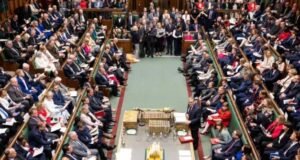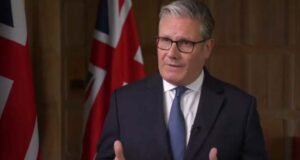The United Kingdom (UK) has called on the international community to provide long-term support to keep Rohingya people — both in Bangladesh and Myanmar– safe in the years to come.
The UK has been at the forefront of that response and has contributed £129 million to support the displaced Rohingya since 25 August 2017, said UK Department for International Development in a statement on Friday.
August 25 marks one year from the devastating man-made crisis which saw the mass exodus of 700,000 persecuted Rohingya men, women and children fleeing Myanmar to Bangladesh.
This time last year the watching world looked on at the scale and speed of this forced movement of people which triggered one of the largest international aid responses in 2017.
The government and the people of Bangladesh have also shown enormous generosity in opening their borders and providing a safe haven for those people fleeing violence. Now the focus is on making sure that the Rohingya people have access to further support while they are living in the camps, said the statement.
The UK aid will provide immediate access to learning opportunities in a safe environment for Rohingya children and also local children living in communities near the camps, as well as providing skill development training to improve the livelihoods for Rohingya men and women, better equipping them for the future.
International Development Secretary Penny Mordaunt said the roots of this crisis go back decades, but 12 months ago we saw an unprecedented campaign of terror by the Burmese military, resulting in 700,000 people fleeing across the border into Bangladesh.
“There’s no doubt that this is a protracted crisis and the British public have enabled hundreds of thousands of lives to be saved through their taxes, and through huge sums raised in voluntary donations. I want to thank all who’ve stepped up and donated or worked to bring hope to so many.”
Mordaunt said it is clear what the international community must now do, and what Myanmar must do. “These people need their lives back and their rights guaranteed. On this anniversary of such barbarism we should recommit ourselves to ensuring that Burma cooperates with the asks of the international community and that nations work to meet to needs of these vulnerable people.”
To date, UK aid has provided lifesaving food, water, shelter and medication to almost a million Rohingya who now live within the camps in Bangladesh.
The UK said it will continue to help all the vulnerable communities remaining in Rakhine State, including 600,000 Rohingya.
“Our humanitarian work and support to education, nutrition, livelihoods and health are designed to address inequalities between different groups and promote progress on the recommendations put forward by the Kofi Annan led Rakhine Advisory Commission.”
The UK continues to press for the conditions to be put in place for the Rohingya to be able to return voluntarily, safely and with dignity to their homes.
Such conditions do not yet exist and any returns process will take considerable time.
UK aid, the crisis in twelve months:
August: Reports of violence and cross border movements triggered our preparations for a rising number of arrivals in Bangladesh.
September: The UK stepped up its existing assistance in the camps and provided £30 million in extra funding which helped to provide food, water and shelter for the new influx of people. In Myanmar, following the events of the 25 August 2017, DFID funded the distribution of clean water and food and the provision of healthcare services to affected communities.
October: The Disaster Emergency Committee (DEC) launched its appeal. DFID announced it would match donations pound for pound up to £5million. In the same month it also pledged a further £12 million of humanitarian assistance at the landmark UN pledging conference.
November: International Development Secretary Penny Mordaunt visited the Cox’s Bazar camps where she witnessed firsthand how UK aid was having an impact on the ground. She also announced an additional £12 million in support for additional food and to increase access to psychosocial support and counselling for victims of sexual and gender-based violence.
December: Following the outbreak of diphtheria in the camps, the UK aid-funded Emergency Medical Team (EMT), made up of the UK’s top medical professionals, was deployed in the days after Christmas to help stem the spread of this deadly disease.
January: The BBC ran a full day of live radio and TV coverage from Cox’s Bazar and announced the UK was playing a significant role in halting the spread of diphtheria within the camps by vaccinating 350,000 children between the ages of six months and 15 years.
February: After six weeks in the camps the EMT returned home having triaged more than 3,000 people and treated almost 500 people for diphtheria. Had it not been for British help, many people could have died. An important part of their legacy was training local Bangladeshi medical professionals in disease prevention.
March: The International Development Committee visited the camps and witnessed how UK aid was saving lives.
April: The Evening Standard reported on the number of babies that were due to be born in the midst of the monsoon and cyclone season. In an interview with the paper the International Development Secretary highlighted how more than 16,000 births were imminent and set out how UK aid was helping to train midwives.
May: Ahead of the looming monsoon and cyclone season, the UK announced continued support to the Rohingya people. The additional £70 million support package is destined to provide immediate support in the form of shelter, food and medication, and longer-term support in the form of livelihood opportunities.
June: UK support helped with the important process of shelter preparations before the looming rains began. New shelters were built and existing shelters strengthened.
July: A flurry of activity in this month saw the final repairs to roads and pathways in the camps. UK support provided to undertake this task will ensure that vital food, medicine and water can to get through into the camps if there is significant flooding.
July also saw a meeting between the International Development Secretary and UNHCR Goodwill Ambassador Cate Blanchett, where they discussed how UK aid is saving lives and what more needs to be done to ensure that the Rohingya people are cared for.
 Weekly Bangla Mirror | Bangla Mirror, Bangladeshi news in UK, bangla mirror news
Weekly Bangla Mirror | Bangla Mirror, Bangladeshi news in UK, bangla mirror news







